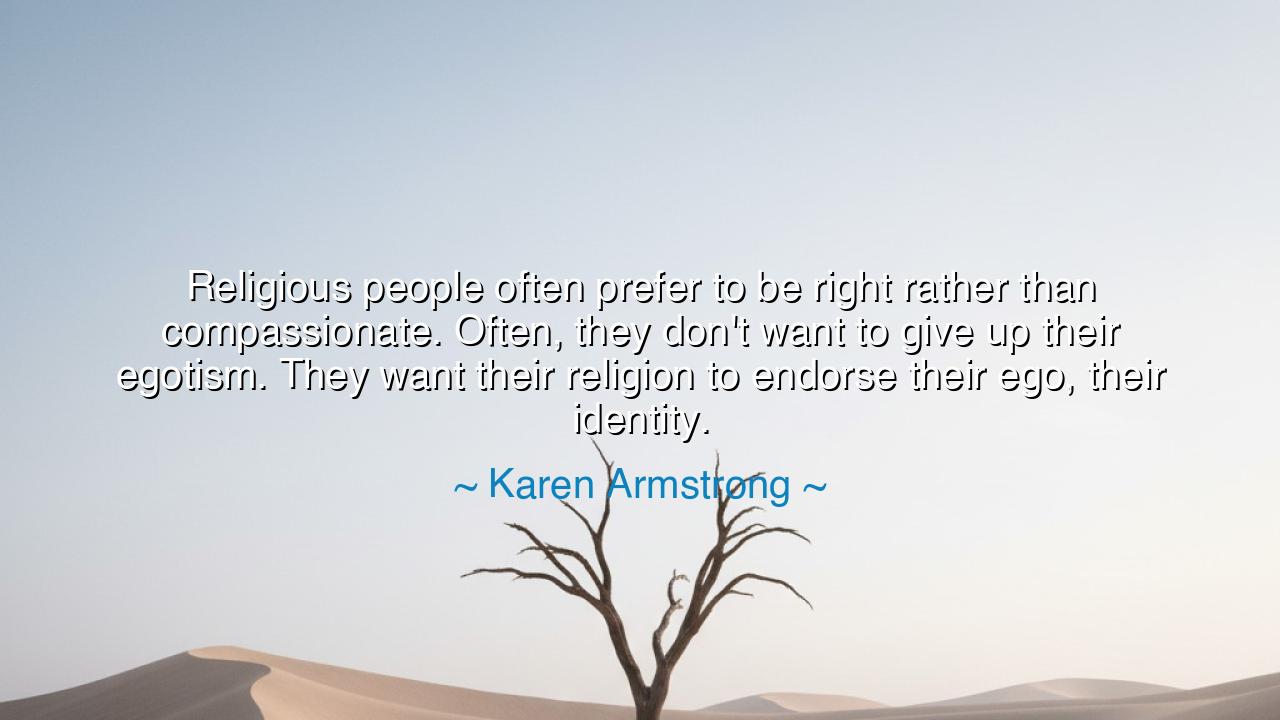
Religious people often prefer to be right rather than
Religious people often prefer to be right rather than compassionate. Often, they don't want to give up their egotism. They want their religion to endorse their ego, their identity.






“Religious people often prefer to be right rather than compassionate. Often, they don't want to give up their egotism. They want their religion to endorse their ego, their identity.” – Karen Armstrong
In this striking reflection, Karen Armstrong, the scholar of faiths and interpreter of the divine, pierces to the heart of one of humanity’s oldest paradoxes: that religion, which was born to teach love and humility, so often becomes the weapon of pride and division. Her words are both lament and warning. She reminds us that when belief hardens into certainty, and when piety becomes a mirror for the self, the sacred fire of compassion is extinguished. The true essence of religion, she says, is not to be right — but to be kind. Yet the human heart, ever hungry for validation, twists even the holiest teachings into echoes of its own ego.
Armstrong’s insight arises from a lifetime of studying the faiths of the world — from Christianity and Islam to Buddhism, Judaism, and beyond. Through her journey, she saw the same pattern repeating across centuries: the transformation of faith into ideology. What begins as a call to transcend the self becomes, in the hands of pride, a tool for elevating it. People cling not to the mystery of God, but to the certainty of their doctrines, demanding that their belief systems endorse their identity. To be right feels safer than to be humble. To be chosen feels easier than to be loving. And so, the ego dresses itself in sacred robes, mistaking self-righteousness for holiness.
The ancients knew this danger well. The Hebrew prophets thundered against those who honored God with their lips but oppressed the poor. Jesus himself, whom Armstrong often calls a teacher of radical compassion, condemned the Pharisees not for their devotion, but for their pride — for turning faith into hierarchy. “Woe to you,” he said, “for you tithe mint and cumin, yet neglect the weightier matters of the law — justice, mercy, and faithfulness.” Armstrong’s quote echoes that same rebuke: that religion without compassion is a dead thing, a hollow echo of divine truth. It becomes, as she says elsewhere, “a symptom of the very selfishness it was meant to cure.”
Consider the story of Ashoka, the great emperor of India. Once a ruthless conqueror, he brought death to thousands in his pursuit of empire. But after witnessing the suffering he caused, he turned inward, finding the teachings of the Buddha — teachings of nonviolence and compassion. Instead of using religion to justify his power, Ashoka used it to dismantle his ego. He ruled henceforth with mercy, building hospitals, shelters, and schools, and sending envoys of peace instead of armies. His story stands as a mirror to Armstrong’s warning: the purpose of faith is not to feed the self, but to dissolve it in service to life.
And yet, Armstrong’s words strike not only at institutions but at every soul that calls itself religious. The battle between ego and compassion is fought not in temples but within the human heart. When a believer insists that their truth alone is divine, when they condemn others rather than understand them, when they cling to belief as a badge of superiority — they have turned from God to self. True religion is not about triumph; it is about transformation. To follow the path of love means to relinquish the need to win, the need to be right, the need to be seen. It means kneeling not only before the altar, but before the pain of another.
Armstrong’s insight carries the weight of ancient wisdom: that all the great teachers — the Buddha, Muhammad, Jesus, the mystics and saints — spoke not of conquest but of compassion. The divine, they said, cannot dwell in a heart full of judgment. To love God is to love others, to see in every face the reflection of the sacred. Yet how easily the ego forgets this truth. How quickly it turns mystery into law, love into rule, faith into weapon. Armstrong’s challenge to us is not to abandon religion, but to purify it — to restore to it the tenderness it once knew.
The lesson is this: do not let your faith serve your ego. Let it break it. Do not seek to be right — seek to be kind. In moments of anger, choose understanding; in moments of pride, choose humility. When you are tempted to judge, remember that every person is fighting their own battle to awaken. Religion is not meant to build walls of doctrine, but bridges of empathy. It is not the crown of the proud but the staff of the weary.
So let the words of Karen Armstrong echo in your heart: “Religion without compassion is only egotism disguised as holiness.” If you would know the divine, live with mercy. If you would speak truth, speak gently. And when your mind hungers to be right, remind your soul that it is far better — and far holier — to be good. For only through compassion does faith return to its source, and only through humility does the human heart reflect the image of God.






AAdministratorAdministrator
Welcome, honored guests. Please leave a comment, we will respond soon